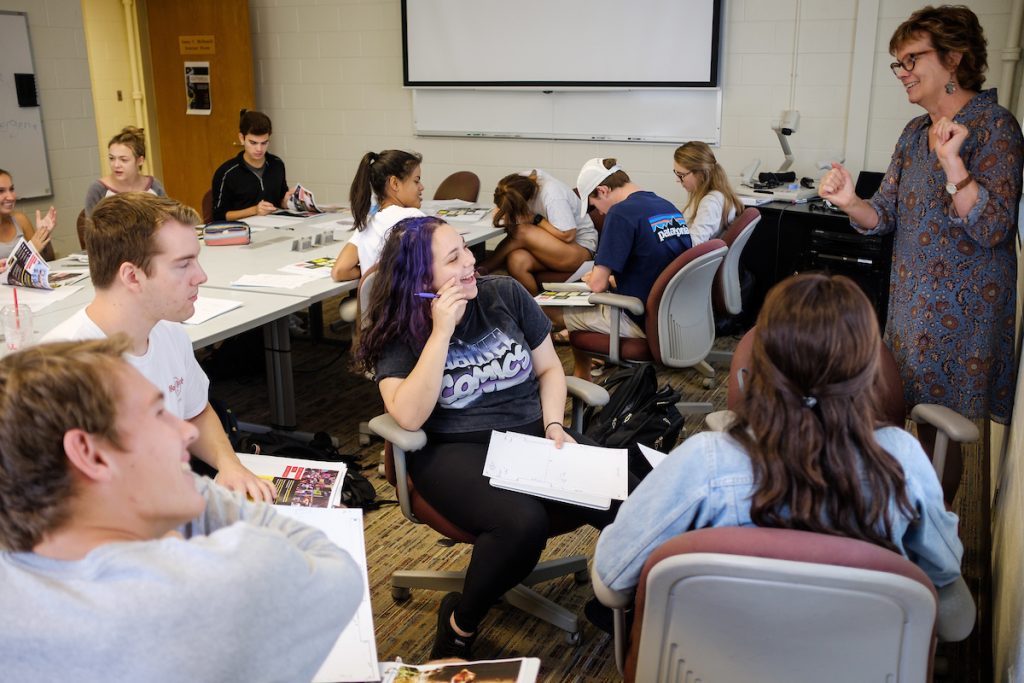First Year Seminar Teaching Resources
Deadline for new FYS proposals (for Fall 2025) is February 21.

First Year Seminars offer faculty an opportunity to build lasting relationships with first year students, explore topics of mutual interest, and help students build skills of analysis and communication. For many students – especially those in the sciences – FYS courses may be the only chance to learn in a small classroom setting during their first year. A measured pace and narrow focus make FYS an ideal setting for first year learning.
The FYS Committee Chairs for 2024-2025 are Lisa Blee (bleelm@wfu.edu) and Melissa Maffeo (masicaml@wfu.edu).
Faculty Quick Links
So that students understand rigorous academic expectations and develop the intellectual skills needed to practice or meet these expectations, the following SLOs apply for each FYS. By the end of an FYS, students will have practiced the following:
- Read increasingly sophisticated texts critically. As one of WFU’s Core Competencies, critical reading is defined as: “the process of understanding, extracting, and questioning written text that allows for the comprehensive explanation of issues, ideas, artifacts, and events before accepting or challenging an opinion or conclusion or constructing new meaning.”
- Pose and respond to complex ideas. This may occur in a variety of formats such as written or oral form, or in class discussion. This maps onto the WFU Core Competency of Inquiry and Analysis defined as: “the systematic process of exploring issues, objects, or works by collecting evidence, deconstructing that which is complex, and developing informed conclusions or judgments.”
- Identify, analyze, interpret and evaluate different points of view. Again, this may occur in a variety of formats. This corresponds to the WFU Core Competency of Critical Thinking defined as: “the ability to explore ideas comprehensively, to ask relevant questions, to evaluate evidence, to imagine and test alternative points of view before accepting or formulating a conclusion.”
- Construct cogent arguments in both written and oral form. This supports the WFU Core Competency of Communication defined as, “The ability to express ideas clearly, exchange knowledge, foster understanding, and/or persuade one’s audience in written and oral form.”
While all FYS should be designed so that students develop the above learning outcomes, faculty may focus on, or emphasize additional competencies, such as creative thinking, quantitative literacy, social relevance, and intercultural learning.
In 2012, Dean Jacque Fetrow requested a comprehensive evaluation of the First Year Seminar program. In response, the Committee on First Year Seminars conducted an in-depth assessment and produced a set of findings, pedagogical recommendations, and specific Student Learning Outcomes (see below and 2014-15 Annual Report of the Committee on FYS) to be used to guide future FYS courses.
The findings of that committee included that First Year Seminars should be designed to:
- spark the intellectual curiosity of students
- introduce them to a thought-provoking topic across the arts, humanities, and sciences
- foster alternative forms of conceptual and creative expression
- create a welcoming and open learning environment that emphasizes forging good relationships among the students and with the faculty member
- foster lifelong learning and academic excellence in a small classroom setting.
The following are important points of pedagogy to create First Year Seminars as sites of student-centered learning (rather than content-oriented) and to distinguish FYS classes from Writing Seminars:
- A central focus of the FYS should be attention to the processes involved in learning, in addition to the coverage of content and mastery of topic. For example, students might learn different ways to investigate or think about the topic by the faculty member framing questions, providing methods of investigation, demonstrating ways of testing evidence, framing alternative questions and responses, etc., in addition to training students in knowledge and research skills practiced in a specific discipline.
- The pace of work should be deliberate so that students are afforded the time to develop increasingly sophisticated or nuanced ways of thinking, reading, listening, and writing/creating.
- Students should be given opportunities to reflect on their development as learners and thinkers, as well as on specific skills, such as reading, writing, oral proficiency, and development of the whole person.
- The priority of the class is on student participation; therefore, faculty members are encouraged to act as listeners, guides, or mentors.
- Though writing is an important component of the FYS course, faculty should consider it in the context of writing to learn, rather than learning to write, since the Writing 111 course is focused on building specific writing skills.
When reviewing and editing proposals prior to submission, please reflect on both the letter and intent of the First Year Seminar program. Note that requests for clarification and revision to submitters from the Committee have often resulted from lack of prior departmental/program approval; omission or inadequate specificity with respect to reading and writing assignments; insufficient information regarding pedagogical method (particularly the opportunities for discussion anticipated for the course and how these will be evaluated); or uncertainty regarding possible overlap with other courses, especially existing upper-division sections and divisional requirements.
The evaluation survey completed by students at the end of their First Year Seminar course asks them to assess how the course helped them meet the FYS student learning outcomes. The current version of this instrument is available for preview upon request, and faculty may prepare their own survey if additional feedback from students is desired.
We encourage First Year Seminar instructors to consider scheduling a library instructional session for their students. First Year Seminars can serve as an excellent arena within which to introduce library research and classroom tools to first year students. Please contact your departmental library liaison to schedule a session.
If you have any questions regarding the development of First Year Seminar proposals, please contact the Chair of the Committee.

